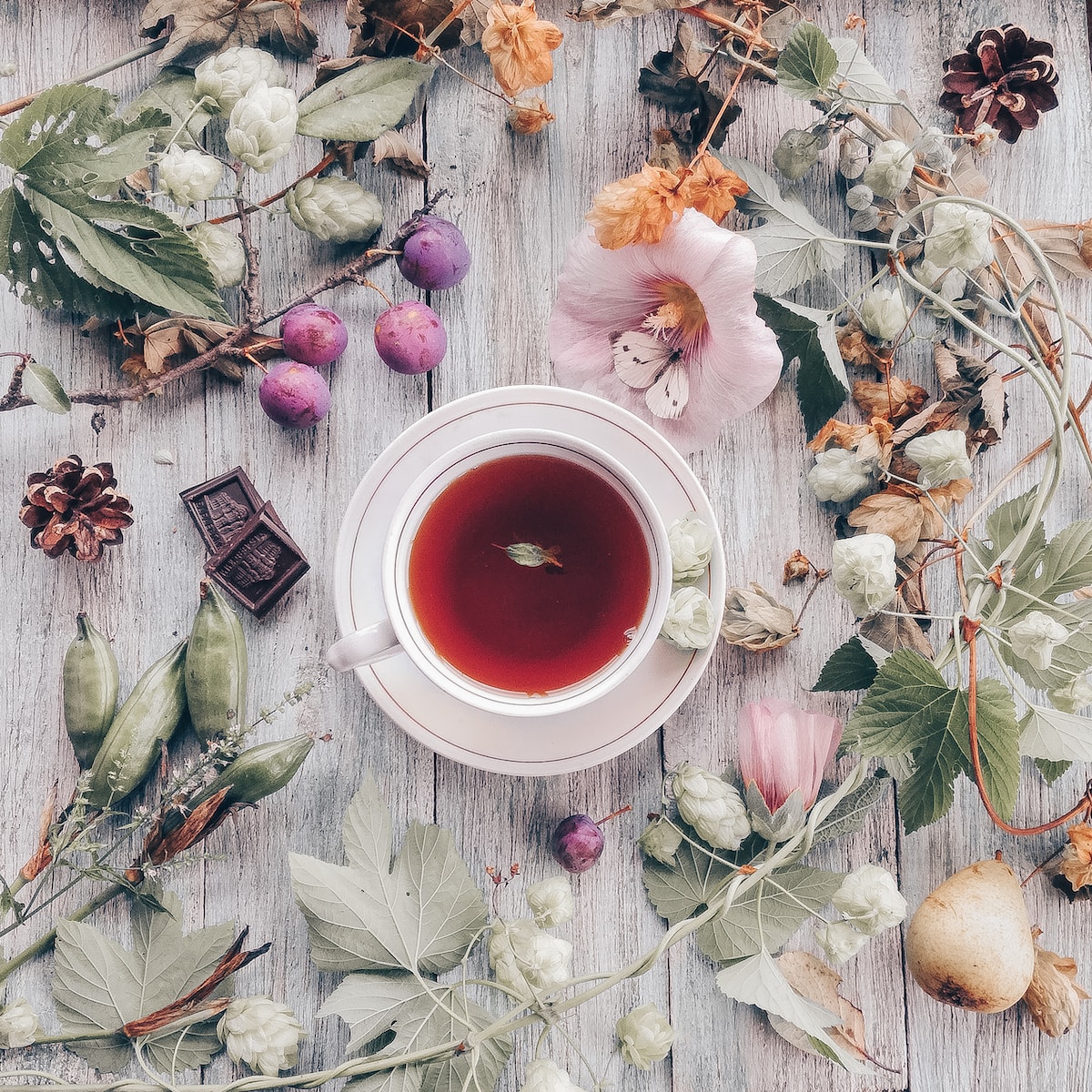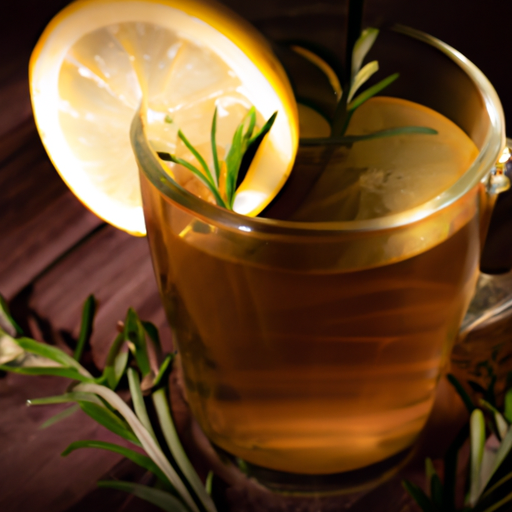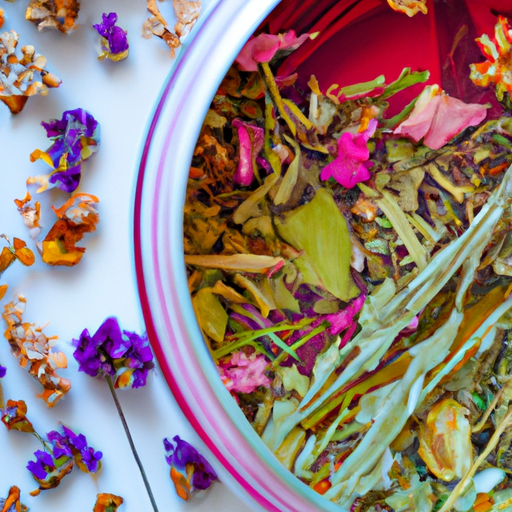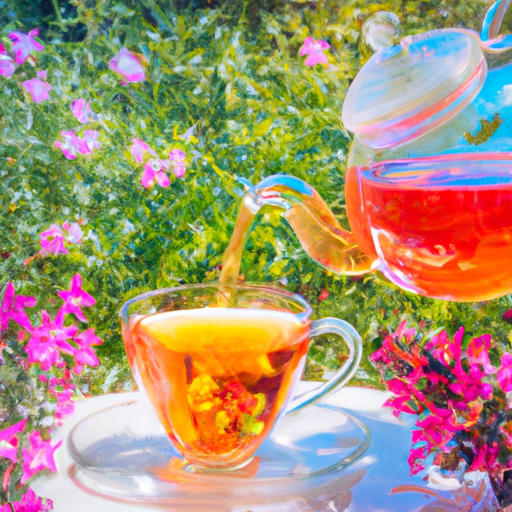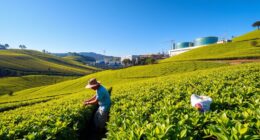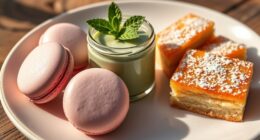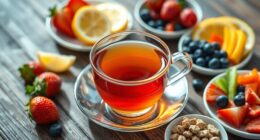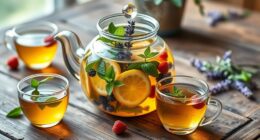Have you ever experienced being as immobile as a vehicle during peak traffic hours? That sensation is comparable to enduring constipation. It’s an uncomfortable, irritating experience that seriously interferes with your everyday activities.
But fear not, because there’s an all-natural solution that may just be brewing in your kitchen. Herbal tea has long been praised for its potential to relieve constipation and get things moving again. But how long does it actually take for herbal tea to work its magic?
In this article, we’ll dive into the world of constipation, explore the benefits of herbal tea, and discuss the timeframe for relief. So grab a cozy cup of tea, sit back, and let’s explore how herbal tea can help alleviate constipation in no time.
Key Takeaways
- Herbal tea is an all-natural solution for constipation.
- Peppermint, ginger, fennel, and dandelion are natural ingredients in herbal tea that promote digestion and relieve constipation.
- Herbal tea generally takes 6 to 12 hours to take effect in relieving constipation.
- Herbal tea should be part of a comprehensive approach to relieving constipation and there are additional methods to consider.
Understanding Constipation and its Causes
Do you ever wonder why you’re feeling so uncomfortable and bloated? Understanding the symptoms of constipation and its causes is crucial to finding relief.
Constipation is a common condition characterized by infrequent bowel movements, difficulty passing stool, and a feeling of incomplete evacuation. It can be caused by various factors such as a low-fiber diet, dehydration, lack of physical activity, certain medications, or underlying medical conditions.
If you’re experiencing persistent constipation or severe symptoms, it’s important to seek medical advice to rule out any serious underlying causes.
In the next section, we’ll explore the benefits of herbal tea in relieving constipation. By incorporating herbal teas into your routine, you may find relief from constipation and improve your overall digestive health.
Exploring the Benefits of Herbal Tea
Herbal tea offers a range of benefits for promoting digestion due to its natural ingredients. These ingredients, such as peppermint, ginger, and fennel, have been found to have soothing effects on the digestive system.
When consumed regularly, herbal tea can help alleviate digestive discomfort and support overall digestive health.
Natural ingredients that promote digestion
Feeling a bit backed up? Let’s explore the natural ingredients that can help promote digestion and get things moving smoothly. Herbal remedies have long been used to alleviate digestive issues, including constipation. Here are some natural ingredients commonly found in herbal teas that can aid in digestion:
- Ginger: Known for its anti-inflammatory properties, ginger can help soothe the digestive system and relieve bloating and indigestion.
- Peppermint: This refreshing herb can relax the muscles of the gastrointestinal tract, promoting smoother digestion and relieving constipation.
- Fennel: With its mild licorice flavor, fennel has been used for centuries to relieve digestive discomfort, including constipation. It can help stimulate bowel movements and reduce bloating.
- Dandelion: This herb acts as a gentle laxative, promoting regular bowel movements and relieving constipation.
These natural ingredients can have soothing effects on the digestive system, helping to relieve constipation and promote overall digestive health.
Soothing effects on the digestive system
Looking to find relief for your digestive system? You’ll be pleasantly surprised by the soothing effects these natural ingredients can have on your digestion. Maintaining good digestive health is crucial for overall well-being, and herbal remedies can play a significant role in promoting a healthy digestive system.
Certain herbs like peppermint, ginger, and chamomile have been used for centuries to relieve digestive discomfort. Peppermint has antispasmodic properties that can help relax the muscles in your gastrointestinal tract, easing bloating and cramps. Ginger has been shown to stimulate digestion and alleviate nausea, making it a great choice for those experiencing digestive issues. Chamomile, on the other hand, has a calming effect on the digestive system, reducing inflammation and soothing an upset stomach.
By incorporating these natural ingredients into your herbal tea, you can support your digestive health and find relief from constipation and other digestive issues. Now, let’s move on to the next section and explore how to choose the right herbal tea for your specific needs.
Choosing the Right Herbal Tea
When it comes to finding relief from constipation, herbal teas can be a great option. Some popular herbal teas known for their ability to relieve constipation include peppermint, ginger, and chamomile. However, it’s important to consider factors such as personal preferences, allergies, and any other health conditions before selecting the best tea for you.
Popular herbal teas for relieving constipation
Want to know which herbal teas can help you relieve constipation?
Herbal tea has been used for centuries to promote healthy digestion and relieve constipation. Certain herbal teas have been found to have specific health benefits for digestion, making them effective in relieving constipation.
Peppermint tea, for example, has been shown to relax the muscles of the gastrointestinal tract, promoting bowel movements and relieving constipation.
Chamomile tea is another popular herbal tea known for its soothing properties, which can help alleviate constipation and promote regularity.
Incorporating herbal teas into your daily routine is simple. You can enjoy a cup of herbal tea after meals or before bedtime to aid digestion and prevent constipation.
Considerations for selecting the best tea for you will be discussed in the next section.
Considerations for selecting the best tea for you
To find the perfect tea for you, all you need to do is consider your personal preferences and taste buds. When it comes to tea selection, there are so many options available that it can be overwhelming.
Start by thinking about the flavors you enjoy. Do you prefer a strong, bold taste or something more subtle and delicate? Consider whether you like floral or herbal notes, or if you prefer a blend of different flavors.
Additionally, think about any dietary restrictions or sensitivities you may have. For example, if you have a sensitivity to caffeine, you might want to opt for a caffeine-free herbal tea.
By taking your personal preferences into account, you can find a tea that not only relieves constipation but also satisfies your taste buds.
Moving on to preparing and drinking herbal tea for constipation relief, let’s explore the next steps.
Preparing and Drinking Herbal Tea for Constipation Relief
Preparing and drinking herbal tea for constipation relief can provide a soothing and natural remedy in no time. Here are three essential steps to consider when preparing and drinking herbal tea for constipation relief:
- Choosing herbal blends: Look for herbal teas that’re known to have laxative properties, such as senna, dandelion root, or peppermint. These ingredients can help stimulate bowel movements and relieve constipation.
- Brewing techniques: Follow the instructions on the herbal tea packaging for the correct brewing time and temperature. Steep the tea for the recommended duration to ensure that the active compounds’re properly released.
- Enjoying the tea: Sip the herbal tea slowly and allow it to soothe your digestive system. You can have multiple cups throughout the day to increase its effectiveness.
By following these steps, you can maximize the benefits of herbal tea for constipation relief. Now, let’s explore how long it generally takes for herbal tea to take effect in relieving constipation.
The Timeframe for Herbal Tea to Take Effect
When you brew and savor a cup of herbal tea, you’ll quickly feel its gentle yet powerful effects on your digestive system. Herbal tea can be an effective remedy for constipation, but the timeframe for it to take effect can vary.
Generally, herbal tea starts working within 6 to 12 hours after consumption. The effectiveness of the tea depends on various factors, such as the type of herbs used, the strength of the brew, and individual differences in metabolism. Some people may experience relief sooner, while for others, it may take a bit longer.
It’s important to note that herbal tea is not a quick fix and should be used as part of a comprehensive approach to relieving constipation.
In the next section, we’ll explore additional methods to relieve constipation.
Additional Methods to Relieve Constipation
When it comes to relieving constipation, there are additional methods that can be beneficial.
Making dietary changes and increasing fiber intake can help promote regular bowel movements.
Incorporating physical activity into your routine can also stimulate the digestive system and help alleviate constipation.
Dietary changes and fiber intake
To start feeling relief from constipation, all you need to do is make some simple dietary changes and increase your fiber intake. Fiber supplements can be a helpful addition to your diet, as they can provide a concentrated source of fiber.
Additionally, staying hydrated is crucial for maintaining regular bowel movements. Drinking enough water throughout the day can help soften the stool and prevent constipation.
Increasing your fiber intake can be done by incorporating more fruits, vegetables, whole grains, and legumes into your meals. These foods are naturally high in fiber and can promote healthy digestion. Remember to gradually increase your fiber intake to avoid any discomfort or bloating.
By making these dietary changes and incorporating more fiber, you can alleviate constipation and improve your overall digestive health.
Moving onto the next section about incorporating physical activity into your routine…
Incorporating physical activity into your routine
Incorporating physical activity into your routine can be a beneficial strategy for improving digestive health and relieving constipation. One great way to incorporate physical activity is by incorporating yoga into your routine. Yoga poses that involve twisting and stretching can help to stimulate the digestive system, promoting regular bowel movements.
Additionally, the benefits of walking should not be overlooked. Walking is a low-impact exercise that can help to stimulate the muscles in the abdomen and promote healthy bowel function. Aim for at least 30 minutes of moderate-intensity exercise, such as brisk walking, five days a week.
Remember to start slowly and gradually increase the duration and intensity of your physical activity. By incorporating yoga and walking into your routine, you can support a healthy digestive system.
Transitioning to the next section, it’s important to consult with a healthcare professional for personalized advice and guidance.
Consultation with a Healthcare Professional
If you have concerns about constipation relief with herbal tea, consulting with a healthcare professional can provide valuable insights and guidance. A healthcare provider is trained to assess your individual situation and provide appropriate medical advice. They can help determine if herbal tea is a suitable option for your constipation relief and advise on the recommended dosage and duration of use.
Additionally, a healthcare professional can evaluate any underlying causes of your constipation and recommend lifestyle changes or other treatments that may be more effective. It’s important to consult with a healthcare professional before starting any new treatment to ensure it’s safe and appropriate for your specific needs. They can provide evidence-based information and personalized recommendations to help you find the most effective solution for relieving constipation.
Frequently Asked Questions
Can herbal tea be used as a long-term solution for chronic constipation?
Herbal tea can provide short-term relief for constipation, but it’s not a long-term solution. Alternative treatments like dietary changes, exercise, and probiotics can have more lasting effects. For example, a patient who switched to a high-fiber diet experienced regular bowel movements.
Are there any potential side effects of using herbal tea for constipation relief?
There are potential risks associated with using herbal tea for constipation relief, such as allergic reactions or interactions with medications. It is important to follow the recommended dosage and consult with a healthcare professional.
How does herbal tea compare to over-the-counter laxatives in terms of effectiveness?
Herbal tea is generally safer and has fewer side effects compared to over-the-counter laxatives. However, the effectiveness of herbal tea in relieving constipation may vary and it may take some time to see results.
Can I drink herbal tea if I’m pregnant or breastfeeding?
Drinking herbal tea during pregnancy and breastfeeding is generally safe, but it’s important to choose the right herbs. Some herbal teas, like chamomile or ginger, can provide relief for common pregnancy discomforts. Consult with a healthcare professional for personalized advice.
What are some common misconceptions about using herbal tea for constipation relief?
Common misconceptions about herbal tea for constipation relief include the belief that it works instantly and that it is a cure-all solution. While it can provide relief, results may vary, and it’s important to consider the pros and cons before relying solely on herbal tea.
Conclusion
In conclusion, herbal tea can be a natural and effective remedy for relieving constipation. It can provide relief within a few hours of consumption due to its soothing properties and ability to promote bowel movements. However, it is important to choose the right herbal tea, prepare it correctly, and incorporate additional methods for optimal results.
Remember, constipation can have underlying causes, so it’s always a good idea to consult with a healthcare professional for a comprehensive approach to managing constipation. So, why not try a cup of herbal tea and experience its gentle and soothing effects?

